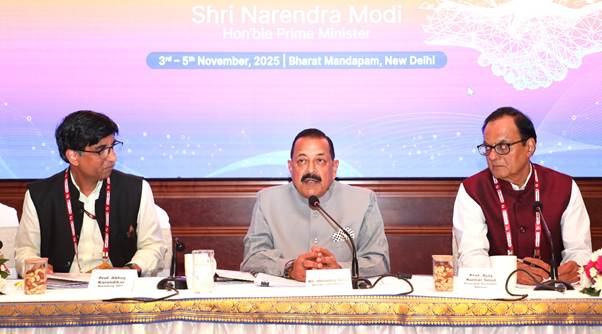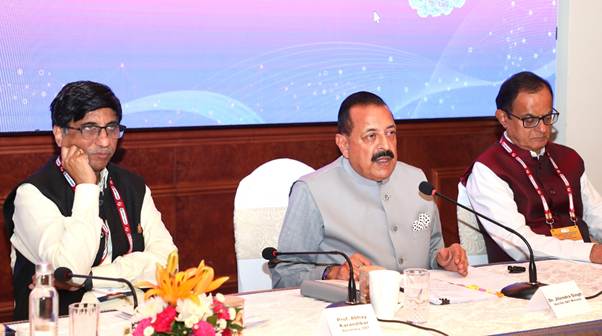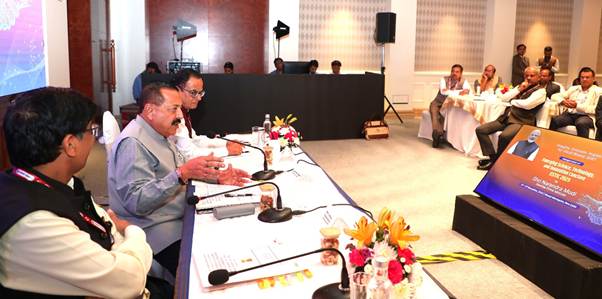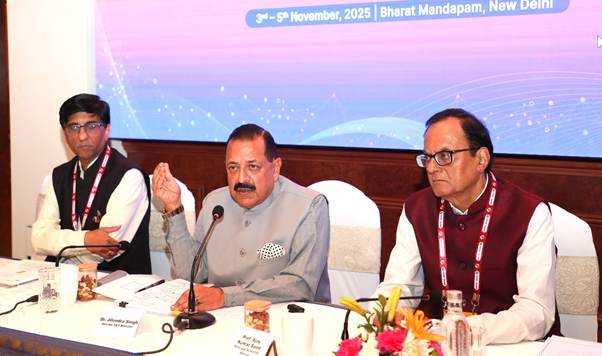Ministry of Personnel, Public Grievances & Pensions
Dr. Jitendra Singh addresses a Round Table on “VAIBHAV Vision for Viksit Bharat” with eminent NRI Scientists and scholars, during the 3-day "Emerging Science, Technology, Innovation Conclave (ESTIC 2025)
“You are not outsiders- you are part of the Indian scientific family”, says Dr Jitendra
Minister calls for transforming India’s engagement with its scientific diaspora from the era of “brain drain” to a model of “reverse brain drain” or "brain exchange" where knowledge, innovation, and ideas flow seamlessly between India and its global talent pool
Dr Jitendra Singh reaffirms PM Sh Narendra Modi’s consistent outreach to the Indian scientific diaspora
India Enters Its Golden Era of Science and Innovation, Says the Minister
Posted On:
04 NOV 2025 6:10PM by PIB Delhi
Addressing a Round Table with eminent NRI Scientists and scholars during the 3-day “Emerging Science, Technology,Innovation Conclave" (ESTIC 2025), Union Minister for Science and Technology Dr. Jitendra Singh said, "You are not outsiders — you are part of the Indian scientific family.”
The Minister was interacting with VAIBHAV Fellows from across the world, who offered a range of constructive suggestions to strengthen India’s science and technology ecosystem.
Dr. Jitendra Singh called for transforming India’s engagement with its scientific diaspora from the era of “brain drain” to a model of “reverse brain drains” or "brain exchange" where knowledge, innovation and ideas flow seamlessly between India and its global talent pool.
The meeting was moderated by Principal Scientific Adviser to the Government, Prof. Ajay Kumar Sood, with Secretary, Department of Science and Technology Prof. Abhay Karandikar, , delivering the welcome address.
VAIBHAV Fellows, representing universities and R&D centres from countries such as the US, Canada, Sweden, and Australia and more, praised the government’s efforts to institutionalize diaspora engagement through the VAIBHAV fellowship. They shared practical ideas for improving collaboration between Indian institutions and global Indian researchers.
One of the strongest recommendations was to create a structured mechanism for student mobility, allowing Indian students to spend up to a year working with their mentors abroad and for host scientists to bring foreign students to Indian labs — a move many said would “extend horizons and nurture global talent.”
A recurring issue raised by several fellows was the need for easier travel and conference clearance procedures. They pointed out that cumbersome processes for inviting international speakers to scientific events in India often hamper visibility and participation. Many urged for a prior approved list of global faculties to simplify visa permissions and enable quick academic exchanges.
The scientists also proposed extending the VAIBHAV fellowship from three to five years, arguing that sustained collaboration takes time to mature and yield measurable results. A fellow working in advanced wireless systems suggested a phased model — three years initially with a two-year extension based on performance — to ensure continuity and accountability.
Another strong theme in the discussion was the need to develop “systems for India” — indigenous technology solutions designed for Indian conditions. Researchers in 5G and 6G technology emphasized the importance of focusing not just on core research but also on real-world system-building suited to India’s scale, density, and affordability challenges.
Several participants also highlighted opportunities for public–private partnerships to translate academic research into industrial innovation. They suggested going beyond traditional PPPs to form cross-border collaborations — linking Indian startups and industries with overseas partners, especially in high-technology and manufacturing domains.
A fellow from Sweden offered a compelling example of leveraging underused research infrastructure in Europe through partnerships with Indian talent, noting that such collaborations could combine India’s scientific capacity with access to world-class facilities abroad.
Responding to the wide-ranging suggestions, Dr. Jitendra Singh said the government is keen to adopt many of the practical ideas shared by the diaspora. He agreed that a simplified travel and approval framework for visiting international faculty could be a significant step forward, and said that the proposal for a prior approved faculty list could be explored with the Ministry of External Affairs.
The Minister cited concrete examples of India’s rising R&D performance, including the fact that more than half of all patents filed in recent years come from resident Indians. He also referred to advances in biotechnology — from the COVID-19 vaccine to the indigenous HPV and haemophilia gene therapy breakthroughs — as well as major space achievements like Chandrayaan-3 and plant biology experiments in space.
Reaffirming the Prime Minister Narendra Modi’s consistent outreach to the Indian scientific diaspora, the Minister said, “You are not outsiders — you are part of the Indian scientific family.” He emphasized that, unlike a few decades ago, today with the growth of digital collaboration tools, Indian diaspora scientists have the option to easily contribute and work for India, even while staying in another country. “With today’s technology, you don’t need to be continuously physically stationed at one place to conduct your work,” he said, describing this new paradigm as a great shift.
Dr. Jitendra Singh also encouraged the scientists to help build industry linkages for sustained innovation, noting that “it is easy to start a startup, but sustaining it requires robust industry partnership.” He pointed to successful models such as India’s lavender-based startups under the Aroma Mission, which have scaled rapidly and are now exploring international tie-ups.
He further clarified that the VAIBHAV fellowship period is only a formal structure, not a limit to engagement. “Just as we don’t remember Gandhi only on Gandhi Jayanti, your connection to India should not end with the fellowship’s duration,” he said, urging fellows to maintain long-term ties through virtual collaborations, joint projects, and mentoring networks.
Concluding his remarks, Dr. Jitendra Singh said that the strength of science lies in its ability to connect beyond borders. He appealed to the diaspora scientists to act as “ambassadors of India’s scientific renaissance,” helping India and the world move closer to the shared goal of Viksit Bharat by 2047.
During the deliberations, Dr. M. Ravichandran, Secretary, Ministry of Earth Sciences, and Dr. V. Narayanan, Secretary, Department of Space, also shared their perspectives, highlighting the growing scope for interdisciplinary collaboration between ocean science, space technology, and emerging research areas under the VAIBHAV framework.
The session concluded with the assurance that the ideas raised would be considered by the Department of Science and Technology and the Principal Scientific Adviser’s Office for follow-up action, reflecting the government’s commitment to deepen global-Indian scientific partnerships under the VAIBHAV initiative.




*****
NKR/AK
(Release ID: 2186363)
Visitor Counter : 811